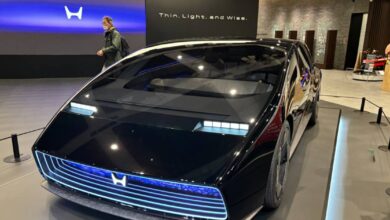Global automakers lose spotlight at Beijing Auto Show

What happened
The 18th edition of the Beijing Auto Show, which runs from April 25 to May 5, witnessed the convergence of 1,500 domestic and international brands, showcasing 41 concept cars and 278 new energy vehicle models. The show also hosted the global premieres of 117 new models, including 30 from multinational automakers.
However, global automakers found themselves no longer dominating the spotlight. Domestic EV makers have captured significant attention both offline and online.
Attendees crowded the BYD booth to catch a glimpse of the latest releases of the Yangwang U8 and U9, as well as Xiaomi’s booth, which displayed its recently released first electric car, the SU7 sedan.
The CEOs of these EV brands are rising to stardom as well. The hashtags “Wang Chuanfu, CEO of BYD, appeared at Xiaomi booth” (#王传福现身小米展台) and “Lei Jun, CEO of Xiaomi, appeared at BYD booth” (#雷军现身BYD展台) have amassed 44 million and 54 million views on Weibo, respectively, drawing significant online traffic to the event.
The Jing Take
Global automakers ventured into the Chinese market during China’s opening-up period in the 1980s. Since then, foreign brands have dominated the country’s auto sector while transferring extensive knowledge to domestic players.
However, 40 years later and the tables have turned.
During this time span, China has established a holistic automotive supply chain boasting unparalleled production capacity and a skilled workforce.
According to data from the China Association of Automobile Manufacturers, the collective market share of foreign brands in the passenger car sector fell to 44 percent in 2023, down sharply from 61.1 percent in 2020.
China nearly surpassed Japan as the biggest auto exporter in 2023, after it defeated South Korea in 2021 and Germany in 2022.
The rise of EV cars in China has played a pivotal role in driving this trend. In 2022, China produced 64 percent of global EVs and accounted for 59 percent of global EV sales.
As a crucial factor for transforming the Chinese automobile industry, China’s EV makers now provide some of the best EV car technologies and solutions to global gasoline car players seeking entry into the EV sector.
In April of this year, two major German auto players, Volkswagen and BMW, announced additional investments of up to 5 billion RMB ($691 million) in China, focusing on electric and intelligent vehicle manufacturing. Volkswagen is committed to remaining the top foreign automaker in China into 2030.
At this year’s Beijing Auto Show, global automakers are also actively looking for partnerships with Chinese brands for deeper collaborations on electric cars.
Toyota announced that it would form strategic partnerships with China’s tech giant Tencent Group on artificial intelligence, cloud computing, and big data. Another Japanese automaker, Nissan, signed an agreement with Chinese tech giant Baidu to carry out research on smart cars.
Meanwhile, French brand Renault revealed that it is negotiating with Li Auto and Xiaomi to develop electric vehicles and smart driving technology.
Although Chinese domestic brands are not short of challenges, with BYD recently reporting its weakest quarterly profit growth since 2022 due to an intense price war, they’re posing serious competition to international stalwarts. This will only intensify with China now fully committed to increasing its share of EVs to 50 percent of all car sales by 2035.
To maintain their edge, global automotive brands need to continually enhance their competitiveness, focusing not only on brand values but also on pricing, technology, and innovation capabilities.
The Jing Take reports on a piece of the leading news and presents our editorial team’s analysis of the key implications for the luxury industry. In the recurring column, we analyze everything from product drops and mergers to heated debate sprouting on Chinese social media.



